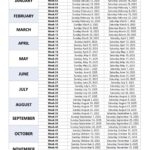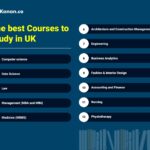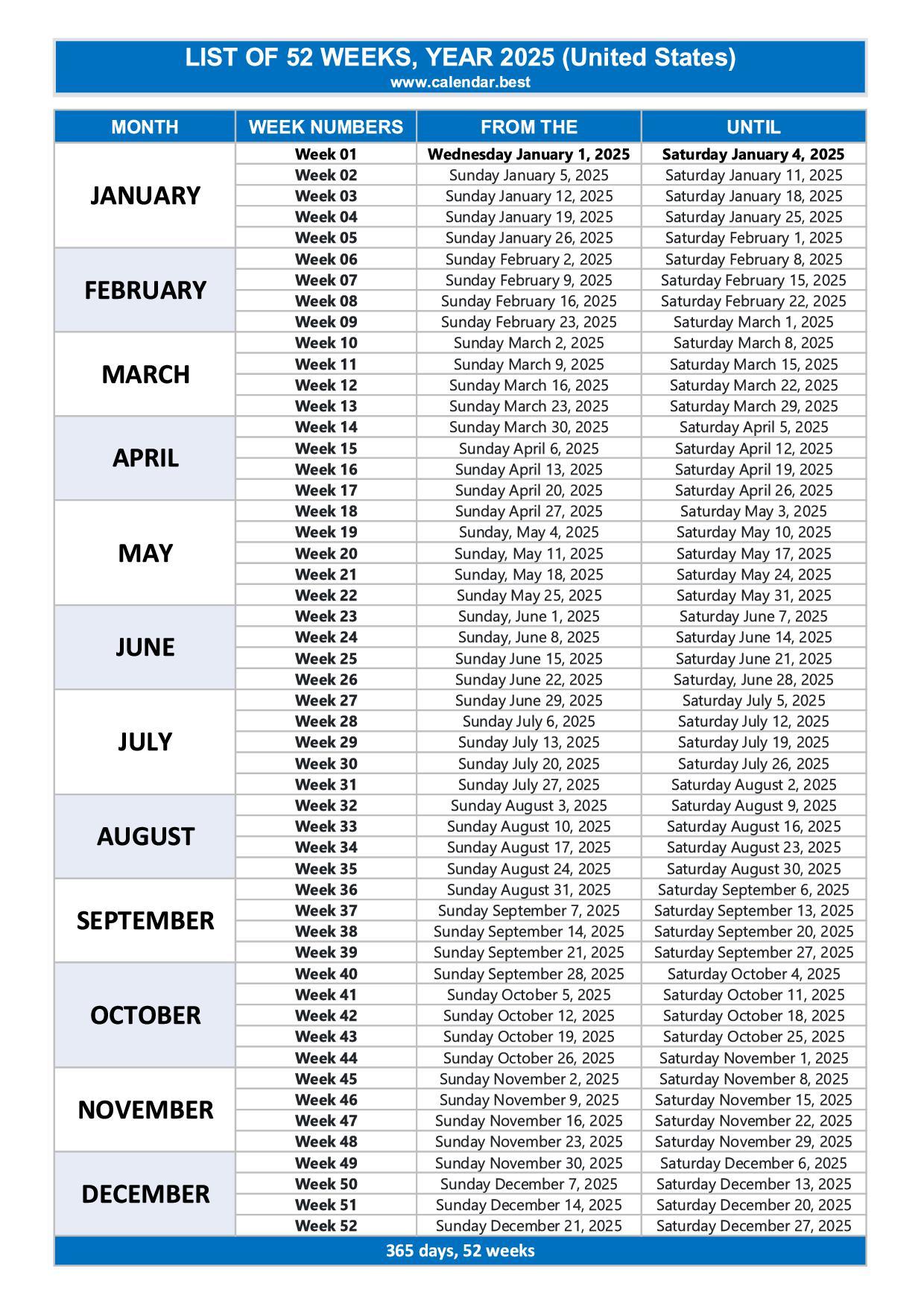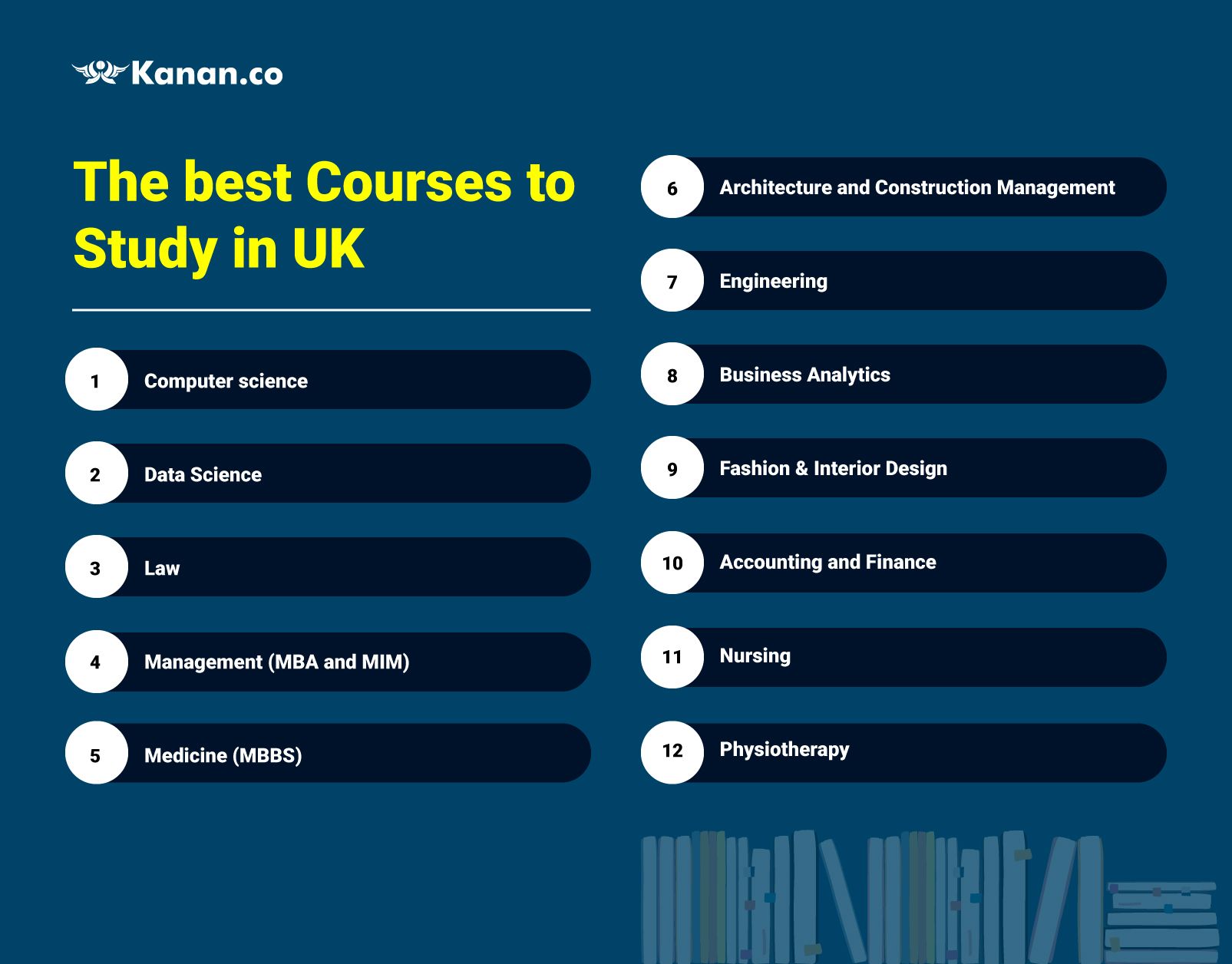Crafting an effective economics personal statement can be challenging. Your statement is your chance to shine and stand out.
An economics personal statement must convey your passion for the subject and your readiness for academic challenges. It should reflect your understanding of economic principles and your ability to think critically. This statement is a crucial part of your application, highlighting your strengths and enthusiasm.
Whether you are aiming for undergraduate or postgraduate studies, a well-written personal statement can make a significant difference. In this blog post, we will explore various examples that can inspire and guide you. These examples will help you understand what works best and how to present your unique story effectively. Let’s dive in and start crafting the perfect personal statement for your economics journey.
Crafting A Unique Personal Statement
Writing a personal statement for economics can be challenging. You want to stand out from other applicants. Here are some tips to help you craft a unique personal statement. Remember, your goal is to highlight your strengths and interests in economics.
Showcase Your Passion
Passion is key in your personal statement. Show your enthusiasm for economics. Use specific examples to demonstrate your interest. For instance, mention books, articles, or economic theories that fascinate you.
Consider sharing a personal story. Maybe you experienced an event that sparked your interest in economics. This makes your statement more engaging and memorable.
Tailor To Your Audience
Know your audience. Each university has its own values and strengths. Research the economics program you are applying to. Highlight how your goals align with their offerings.
Mention specific courses or professors that interest you. This shows that you have done your homework. It also indicates that you are genuinely interested in their program.
| What to Include | Why It Matters |
|---|---|
| Specific Interests | Shows your genuine passion |
| Personal Stories | Makes your statement memorable |
| Research on Program | Demonstrates your dedication |
- Use simple language.
- Keep sentences short.
- Be honest and sincere.
- Edit and proofread your statement.
Structuring Your Statement
Writing an Economics Personal Statement can feel overwhelming. Structuring your statement correctly makes it easier to read and more compelling. This section will guide you on how to structure your statement effectively, ensuring each part serves its purpose.
Introduction Tips
The introduction sets the tone for your statement. Start with a strong, attention-grabbing sentence. This could be a personal anecdote or a fascinating fact about economics. Make sure to explain why you are passionate about economics. Mention any key influences or experiences that sparked your interest.
Keep your introduction concise. Aim for around 3-4 sentences. This way, you can quickly engage the reader and lead them into the body of your statement.
Body Content
The body of your statement is where you provide detailed information. Divide this section into clear paragraphs. Each paragraph should focus on a different aspect of your qualifications and experiences.
- Academic Achievements: Discuss relevant coursework, projects, and grades.
- Extracurricular Activities: Highlight activities that demonstrate your interest in economics.
- Work Experience: Mention any internships or jobs related to economics.
- Skills: Outline key skills such as analytical thinking, research, and problem-solving.
Use specific examples to support your points. This makes your statement more convincing and memorable.
Compelling Conclusion
Your conclusion should summarize your main points and leave a lasting impression. Reiterate your passion for economics and your career goals. Explain why you are a good fit for the program you are applying to.
End with a positive and forward-looking statement. For example, “I am excited to further my knowledge in economics and contribute to the field.”
A strong conclusion can make your statement memorable. Keep it short and impactful.
Highlighting Relevant Experience
Highlighting your relevant experience is crucial in an Economics personal statement. It showcases your dedication and suitability for the field. This section should include academic achievements and any professional experience that relates to economics. Let’s delve into how to present these experiences effectively.
Academic Achievements
Your academic achievements are vital. They demonstrate your capability and commitment to studying economics. Mention any awards or honors. Highlight courses that are relevant. These could include microeconomics, macroeconomics, or statistics. Show your understanding and passion for these subjects.
Include any research projects. Did you write a paper on economic theories? Did you participate in any academic competitions? These details are important. They show your practical application of economic concepts.
Professional Experience
Professional experience is equally important. It shows your practical understanding of economics. Internships in financial institutions or research roles are valuable. Describe your responsibilities clearly. What did you learn? How did you apply economic theories in real-world scenarios?
Even part-time jobs can be relevant. Did you manage a budget? Did you analyze financial data? These experiences are important. They show your ability to apply classroom knowledge in the workplace. Highlighting both academic and professional experiences will make your personal statement strong and compelling.
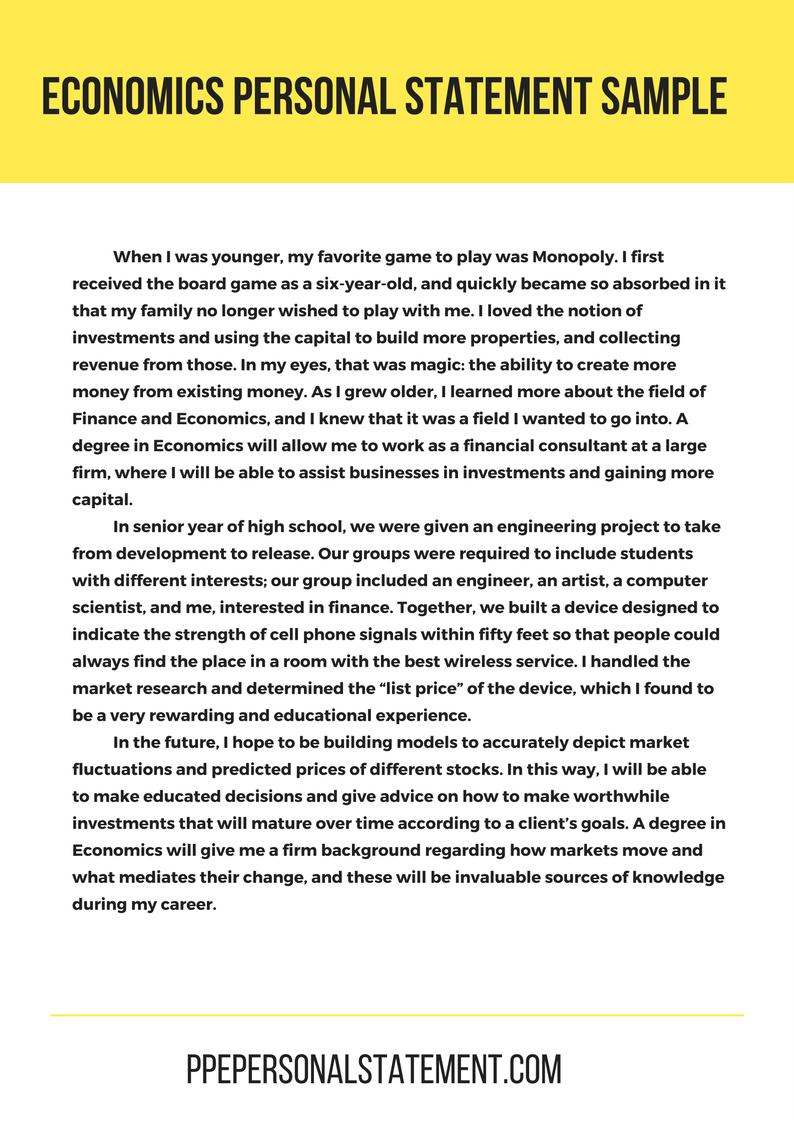
Emphasizing Key Skills
When writing an Economics Personal Statement, emphasizing key skills is crucial. These skills showcase your ability to excel in the field. Key skills often include analytical and communication abilities. Presenting these skills effectively can make your statement stand out.
Analytical Skills
Strong analytical skills are essential in economics. They help you understand complex data and draw meaningful conclusions. Here are some ways to highlight your analytical skills:
- Data Analysis: Demonstrate your ability to interpret data. Mention specific tools like Excel or R.
- Problem-Solving: Give examples of how you solved economic problems. Use real-life scenarios.
- Critical Thinking: Show your ability to evaluate economic theories. Explain how you challenge assumptions.
To illustrate, you might write:
“During my internship at XYZ Company, I analyzed market trends using Excel. This allowed me to predict sales patterns accurately.”
Communication Skills
Effective communication skills are vital. They enable you to share complex ideas clearly. Highlight your communication skills through these points:
- Writing: Show your ability to write clear reports. Mention any published articles or papers.
- Presentations: Discuss your experience in presenting data. Highlight your use of visual aids like graphs or charts.
- Teamwork: Explain how you collaborated with others. Provide examples of successful group projects.
For instance, you could say:
“I presented my research on economic policies at the university seminar. My clear and concise delivery received positive feedback.”
By emphasizing these key skills, your Economics Personal Statement can effectively showcase your strengths.
Showcasing Personal Qualities
Writing an Economics Personal Statement requires more than just academic achievements. It is essential to showcase personal qualities that make you stand out. These qualities highlight your potential to succeed in the field. Here are a few ways to effectively showcase your personal qualities.
Leadership Examples
Leadership is a key trait for any economist. It shows your ability to guide, inspire, and influence others. Here are some ways to showcase your leadership skills:
- Leading a Project: Describe a project where you took charge. Explain your role and the outcomes achieved.
- Managing a Team: Share an instance where you managed a team. Focus on how you motivated and organized the group.
- Initiating Change: Talk about a time you initiated a change. Highlight the impact of your leadership on the process.
Example:
“As the president of the Economics Club, I organized workshops. This improved our members’ understanding of economic theories. I coordinated with professors and students, ensuring effective communication and participation.”
Teamwork Stories
Economics often involves collaborative work. Showcasing your ability to work well in a team is crucial. Here are some suggestions:
- Group Projects: Mention group projects you have been part of. Focus on your role and contributions.
- Collaborative Research: Highlight any collaborative research work. Explain the dynamics and your input.
- Extracurricular Activities: Discuss teamwork in extracurricular activities. Emphasize your cooperation and support within the team.
Example:
“During my internship, I worked with a team on market analysis. My role was to gather and analyze data. Our combined efforts led to a successful report that influenced company strategy.”
Showcasing your personal qualities can significantly strengthen your Economics Personal Statement. Use specific examples to highlight your leadership and teamwork abilities. These qualities will demonstrate your readiness for the challenges in the field of Economics.

Avoiding Common Pitfalls
Writing an Economics personal statement can be challenging. Many applicants fall into common traps. Avoiding these pitfalls can make your statement stand out. In this section, we focus on what to avoid.
Clichés To Avoid
Clichés make your statement sound unoriginal. Phrases like “I have always been passionate about economics” are overused. Many applicants use them. They do not add value. Be specific about your interests. Share unique experiences that sparked your interest.
Another cliché is “I want to make a difference.” This is vague. Explain how you plan to make a difference. Use concrete examples. Avoid general statements. Focus on what makes your journey unique.
Overused Phrases
Common phrases like “team player” and “hardworking” are overused. These words do not show your uniqueness. Demonstrate these qualities with examples instead. Show, don’t just tell.
Phrases like “think outside the box” are also common. They do not stand out. Be creative with your wording. Describe your thought process in specific situations. Use fresh language to keep the reader engaged.
Using Examples Effectively
Using examples effectively can elevate your economics personal statement. Examples provide concrete evidence of your skills and experiences. They help admissions officers understand your journey and passion for economics. This section will focus on real-life scenarios and quantifiable achievements.
Real-life Scenarios
Real-life scenarios make your personal statement relatable. Share experiences where you applied economic theories in real situations. For instance, you might have analyzed a local business’s financial health. Describe how you used economic principles to make recommendations. This shows your ability to connect theory with practice.
Another example could be a volunteer project. Explain how you helped a community organization with budget planning. Detail your role and the economic tools you used. Real-life scenarios demonstrate your practical knowledge and problem-solving skills.
Quantifiable Achievements
Quantifiable achievements add credibility to your personal statement. Use numbers to highlight your accomplishments. For example, mention if you improved a project’s efficiency by 20%. Or, note if your economic analysis saved a company a specific amount of money.
Include academic achievements too. Discuss any awards or recognitions you received in economics. If you scored top marks in a challenging course, mention it. Quantifiable achievements provide clear evidence of your abilities and dedication.
Polishing Your Statement
Your Economics personal statement is almost ready. Now, it’s time to polish it. This step ensures clarity and professionalism. Let’s dive into some essential tips to refine your statement.
Proofreading Tips
Proofreading is crucial. It helps eliminate errors and improves readability. Here are some effective tips:
- Read Aloud: Reading out loud can help you catch awkward phrases.
- Take Breaks: Rest between writing and proofreading. Fresh eyes spot more mistakes.
- Focus on One Error Type: Look for spelling errors in one read, grammar in another.
- Use Tools: Leverage grammar checkers like Grammarly, but don’t rely solely on them.
- Check Formatting: Ensure consistent font, size, and spacing.
Seeking Feedback
Feedback from others can provide new insights. Here’s how to seek and use feedback effectively:
- Ask Teachers or Mentors: They have experience and can provide valuable advice.
- Peer Review: Friends or classmates can spot mistakes you missed.
- Join Online Forums: Platforms like Reddit have communities willing to help.
- Be Open to Criticism: Accept constructive feedback without taking it personally.
- Revise Accordingly: Make necessary changes based on feedback received.
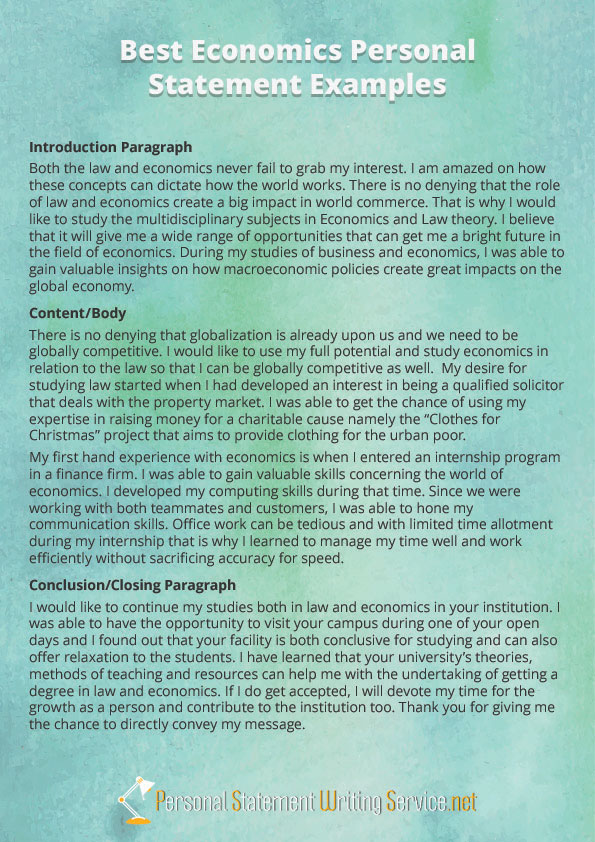
Frequently Asked Questions
What Should An Economics Personal Statement Include?
An economics personal statement should include your interest in economics, relevant experiences, academic achievements, and career goals. Highlight your skills and passion for the subject.
How Do You Start An Economics Personal Statement?
Start an economics personal statement with a compelling introduction. Mention a specific experience or interest that inspired your passion for economics.
How Long Should An Economics Personal Statement Be?
An economics personal statement should typically be around 500-800 words. Follow the specific guidelines provided by the institution.
What Makes A Strong Economics Personal Statement?
A strong economics personal statement is clear, concise, and showcases your genuine interest. It should highlight relevant skills, experiences, and future aspirations.
Conclusion
Crafting a strong economics personal statement is crucial. It reflects your passion and commitment. Use clear language and express your unique perspective. Remember to highlight your achievements and goals. Show genuine interest in economics. A well-written statement can make a big difference.
Focus on your strengths and experiences. Proofread to ensure clarity and correctness. Your personal statement is your chance to stand out. Make it count!
